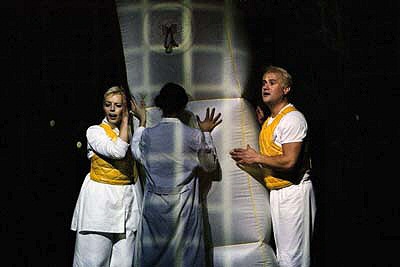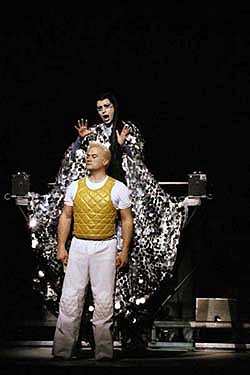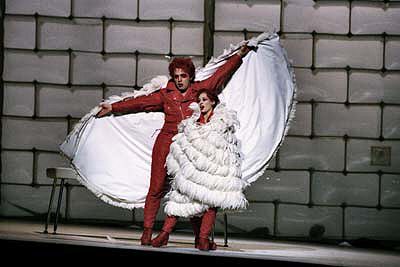Seen and Heard International
Opera Review
Mozart, Die Zauberflöte,
Opéra National de Paris, Bastille, February 18, 2005
(FC)
This production, one of the centerpieces of the first Gerard Mortier
season at the Paris Opera, has taken such a drubbing from the
local press that the opera’s website has taken to publishing
thank-you notes from kids to demonstrate that at least some audience
segments liked it. Could it merit all that vitriol? The short
answer: yes.
He enlisted the risk-taking, razzle-dazzle Spanish troupe La Fura
dels Baus, (who first came to international attention with their
spectacular opening event of the 1992 Olympics in Barcelona) to
stage this Magic Flute. It was first seen at the Ruhr Triennial
Festival in 2003 and later on European TV.

Two ideas predominate in the effort to “deconstruct”
this opera. The first was to eliminate the spoken dialogue of
the opera and substitute, in its place, overstuffed prose on Big
Ideas. The second was to give center stage to a half-dozen or
so Jolly Green Giant-sized inflatable mattresses, which the dwarfed
characters dodged or stumbled upon when obliged to climb on and
try to walk. A sizable crew was needed onstage the entire night
pushing, pulling and hefting these into the sky. Costuming was
bizarrely comic strip. Tamino and Pamina were stuffed into white
jumpsuits with yellow day-glo flack jackets, for example. Busy
video projections were on-again, off-again with words snaking
before your eyes to questionable effect.
The elimination of spoken dialogue seemed to
gut the theatrical heart of the opera. It was, finally, an evening
of Zauberflöte “highlights” with some
mostly irrelevant amplified musings by two actors perched on high
judges chairs stage left and right looking like they were borrowed
from the French Open. These words were in French while the sung
dialogue was still in German.

The cast, most of whom I have heard before, some in the same roles,
sounded strained and pallid. A Paris regular, the dependable tenor
Paul Groves, for example, sang Tamino. I have heard him several
times and I was surprised at his lack of vocal presence here.
His most effective moment was the aria “Dies Bildnis ist
bezaubernd schön” which he delivered stage front. But
when he sang down stage, he sounded like he was in a different
arrondissement. Same thing for Erika Miklosa as the Queen
of the Night. Making her Paris Opera debut, she arrived hoisted
on a rolling platform but was most impressive while singing “O
zittre nicht” thrust out above the orchestra, her long silver
gown close to the gesturing arms of conductor Marc Minkowski.
The giant stage was usually just decorated with these inflatable
mattresses and the audience could see off into the wings on either
side. Thus the vocal villain of the evening likely was the stage
décor which ended up acting like a giant sound sponge.

Another casualty of the evening was Mozart’s genius as theater
magician. The moment when Papageno and Papagena meet is followed
by the duet “Bei Männern, welche Liebe fühlen”
- a disarmingly simple tune describing the first breath-catching
touch of love. Here the couple, engagingly sung by baritone Stéphane
Degout and soprano Clair Ormshaw, meet in a pool of Styrofoam
balls (the kind kids play in at IKEA while their parents shop)
and the duet seems like an afterthought when the two are unceremoniously
dumped out, laying among the balls. Fun for the kids? Maybe. Good
for Mozart? Probably not.
Maestro Minkowski has shown that he is one of the finest Mozart
conductors working today. Here, however, he was leading the Opera’s
own orchestra and the group played like the tenured civil servants
they are, starting and stopping (mostly) at the same time. There
was little of the sparkle or wit that seems to flow easily from
Les Musiciens du Louvre-Grenoble, his regular band. The Sarastro,
Ain Anger, seemed to be missing his low notes - no small problem
for that role - but otherwise the others in the cast made solid
contributions with particular mention for Wolfgang Holzmair’s
gracious Sprecher. The night I attended Julia Kleiter was an effective
substitute Pamina for the indisposed Mureille Delunsch.
The Paris Opera has in storage two Magic Flute productions - by
Robert Wilson and Benno Besson - that are among the finest anywhere.
The decision to add this one to the list is, at best, a questionable
one.
Frank Cadenhead
© Ursula Kaufmann & Opéra National de Paris: Paul
Groves (Tamino), Erika Miklosa (Königin der Nacht), Mireille
Delunsch (Pamina), Stéphane Degout (Papageno)





